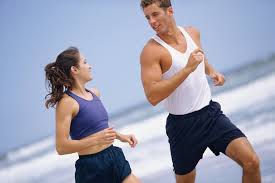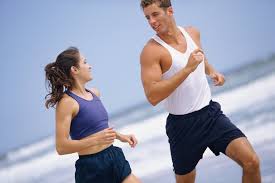 Vassilios Gerodimos, Assistant Professor at the University of Thessaly and Scientific Officer of the Ministry of Health's "Alliance for Health - Exercise" program, answers five basic questions about gymnastics and its effect on our health.
Vassilios Gerodimos, Assistant Professor at the University of Thessaly and Scientific Officer of the Ministry of Health's "Alliance for Health - Exercise" program, answers five basic questions about gymnastics and its effect on our health.Why is it important to exercise?
Regular exercise brings many positive health benefits:
a) reduces body fat, increases muscle mass and consequently increases basal metabolism;
b) improves heart function and the ability to carry oxygen to the muscles;
c) lowers triglyceride and LDL ("bad") cholesterol levels, and increases HDL ("good") cholesterol levels;
d) helps to better regulate blood glucose,
e) increases muscle strength and endurance, mobility and improves balance;
f) helps to increase or maintain bone density, reduces stress and anxiety;
g) improves self-confidence, self-image and contributes to the socialization of the individual.
How much should I exercise?
Also, 3-5 times / week, for at least 30 minutes, in organized or non-organized exercise programs of moderate to high intensity, with the aim of improving physical condition (aerobic capacity, muscle strength and endurance, mobility, balance).
What should my exercise program include?
The program must include the following:
a) activities to improve aerobic capacity, 3-5 times a week (walking, running, cycling, exercising in the water, exercising on an elliptical machine, etc.);
b) exercises with body weight, with auxiliary organs or with resistance, for the strengthening of large muscle groups, 2-3 times / week,
c) exercises to improve mobility (flexibility-flexibility) and coordination skills (balance, ability to rhythm, ability to orient in space, etc.), 2-3 times / week.
What should I watch out for before exercising?
a) It all starts with the medical examination. Tell your doctor about your desire to exercise. The doctor will recommend the necessary tests that you may need to undergo (hematology, cardiology, etc.).
b) Nutrition. Do not exercise immediately after a meal (at least two hours should elapse).
c) Hydration (fluid intake). Approximately 5-7ml / kg body weight four hours before exercise and 3-5ml / kg body weight two hours before exercise.
d) Equipment. Obtain appropriate equipment (clothes, shoes, exercise accessories, etc.) depending on the requirements of each activity.
What should I watch out for during exercise?
During exercise we should consult a trainer for safer and more effective exercise.
- If you choose to exercise on your own, choose low to moderate intensity activities, suitable for your age and current physical condition. Proper warm-up and recovery, necessary in every exercise program.
- Stop exercising immediately and consult your doctor if you experience any of the following symptoms: chest pain, dizziness, nausea, severe fatigue, etc.
- Pay special attention to hydration of the body (fluid intake).
- Avoid exercising outdoors when the ambient temperature is too high or too low.
"Exercise is inextricably linked to physical and mental health and to be effective it should be an integral part of the individual's daily life," reminds Mr. Gerodimos.
Source: health.in.gr
